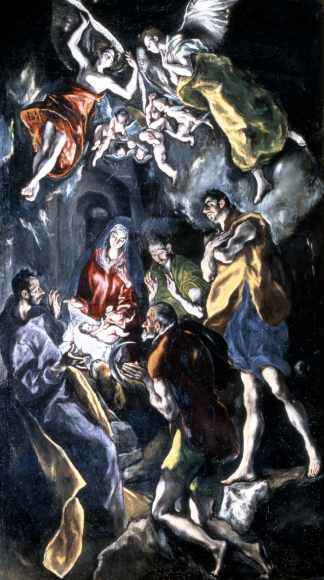![[The Temple, Detail of Model]](Temdtl.jpg) from The Temple (1633), by George Herbert:
from The Temple (1633), by George Herbert:
![[The Temple, Detail of Model]](Temdtl.jpg) from The Temple (1633), by George Herbert:
from The Temple (1633), by George Herbert:
ALl after pleasures as I rid one day, My horse and I, both tir’d, bodie and minde, With full crie of affections, quite astray, I took up in the next inne I could finde, There when I came, whom found I but my deare, My dearest Lord, expecting till the grief Of pleasures brought me to him, readie there To be all passengers most sweet relief? O Thou, whose glorious, yet contracted light, Wrapt in nights mantle, stole into a manger; Since my dark soul and brutish is thy right, To Man of all beasts be not thou a stranger: Furnish & deck my soul, that thou mayst have A better lodging then a rack or grave. |
THe shepherds sing; and shall I silent be? My God, no hymn for thee? My soul ’s a shepherd too; a flock it feeds Of thoughts, and words, and deeds. The pasture is thy word: the streams, thy grace Enriching all the place. Shepherd and flock shall sing, and all my powers Out-sing the day-light houres. Then we will chide the sunne for letting night Take up his place and right: We sing one common Lord; wherefore he should Himself the candle hold. I will go searching, till I finde a sunne Shall stay, till we have done; A willing shiner, that shall shine as gladly, As frost-nipt sunnes look sadly. Then we will sing, shine all our own day, And one another pay: His beams shall cheer my breast, and both so twine, Till ev’n his beams sing, and my musick shine. |

|
|
Nativity with Shepherds and Angels by El Greco, c. 1605 |
|
Optional music: ''While Shepherds Watched Their Flocks'' after Christopher Tye (c.1500-73) |
|
For the Gospel account see Luke 2:8-20. Link has commentary and several translations. In 1954, R. Vaughn Williams wrote Hodie, a Cantata, also called "On This Day." The texts come from the Gospels, Milton, Hardy, and "Christmas" by George Herbert, among others. Williams uses the second part of the poem, "The Shepherds sing . . ." for the 4th movement of the Cantata. On "Christmas [A]" Note on Sonnet form and organization. Note on Form: Herbert’s poems sometimes take a double-poem organization with two separate stanza forms. Because he played the lute and was familiar with popular songs of his day, he may have adapted this two-part structure. He may even have intended the poems to be sung. When used simply for dancing [the pavane] was followed by a quicker dance in triple time, generally a galliard, consisting of leaps. Such pairing of dances was a constant practice throughout the [sixteenth] century. - Alec Robinson and Denis Stevens, ed. The Penguin History of Music (Penguin Books: Baltimore, 1967) Vol. 2, p. 179. John Dowland used the rounded binary [AABB] form in "The Sacred Queen Elizabeth, Her Galliard," and Thomas Morley used it in "The Merry Month of Maying." On the 2-in-1, or binary, poem form see also The H. Communion, Easter, Good Friday, Church-floor and The Offering. On the poems as lyrics for his own music: When he [Herbert] was first married he lived a yeare or better at Dantesey house. H. Allen, of Dantesey, was well acquainted with him, who has told me that he had a very good hand on the lute, and that he sett his own lyricks or sacred poems. 'Tis an honour to the place, to have had the heavenly and ingeniose contemplation of this good man, who was pious even to prophesie -- John Aubrey, 1669-96, Brief Lives, ed. Clark, vol. I, pp. 309, 310. [From Moulton's Library of Criticism.] |
| Music Interpretation: "Christmas" (both parts), by Red Dragon. To open music in another window. |
| 1633 Poem Index | George Herbert & The Temple Home Page |